Unit 12 You’re supposed to shake hands.Section B
文档属性
| 名称 | Unit 12 You’re supposed to shake hands.Section B | 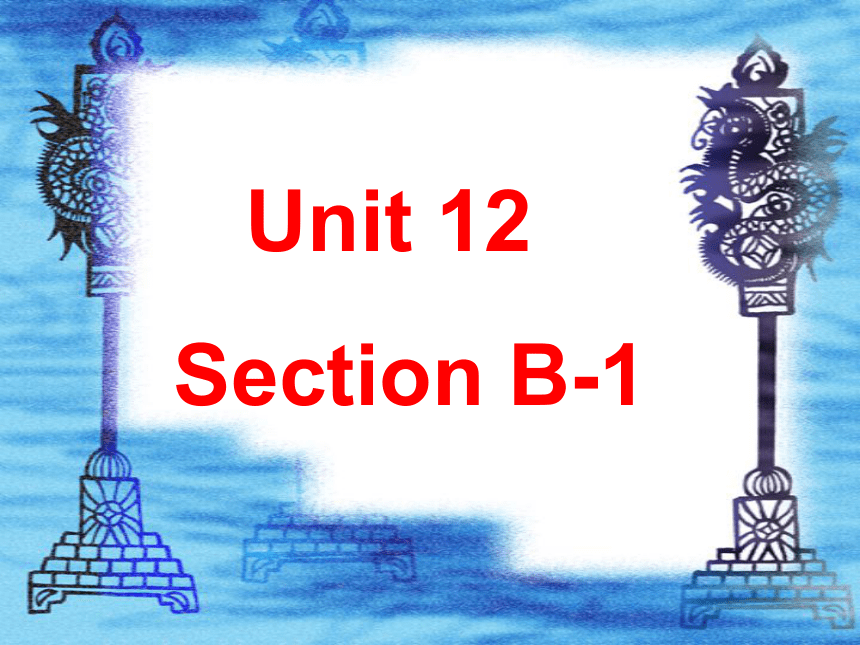 | |
| 格式 | rar | ||
| 文件大小 | 2.5MB | ||
| 资源类型 | 教案 | ||
| 版本资源 | 人教新目标(Go for it)版 | ||
| 科目 | 英语 | ||
| 更新时间 | 2011-03-19 13:37:00 | ||
图片预览

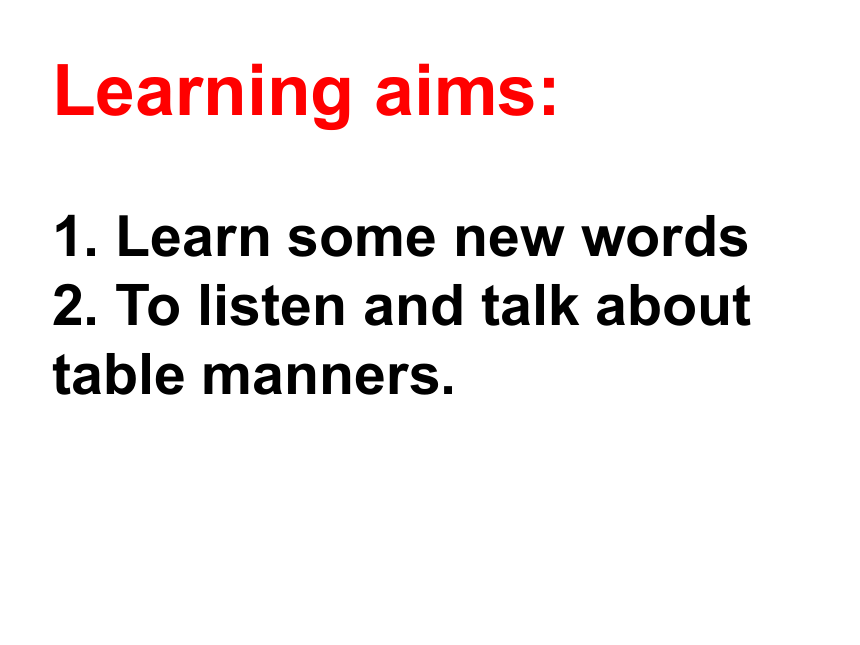
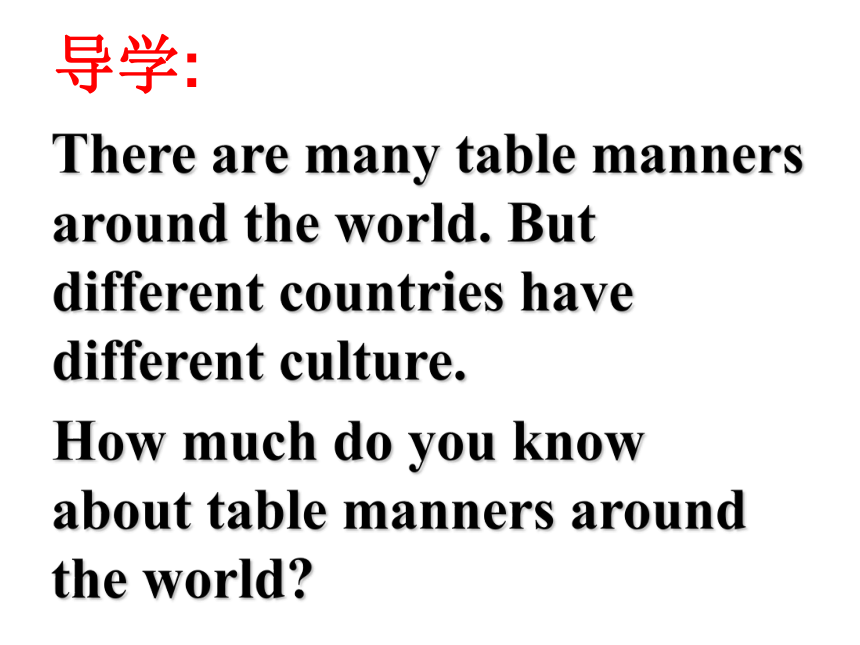
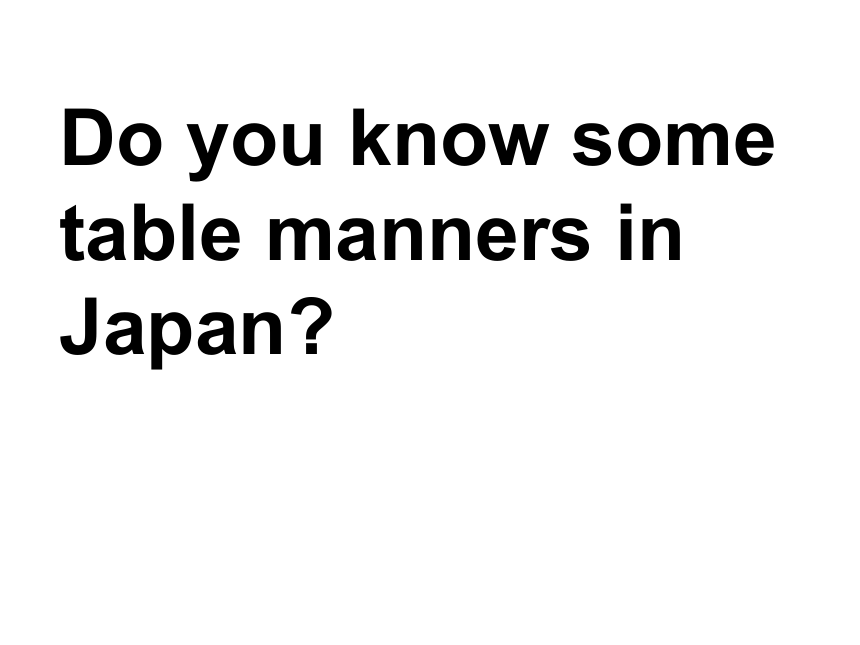
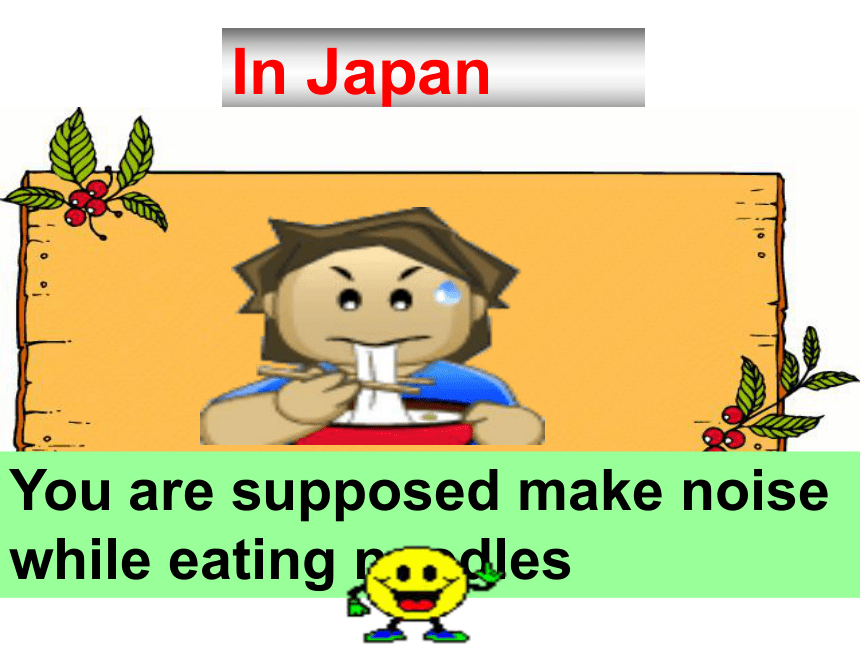
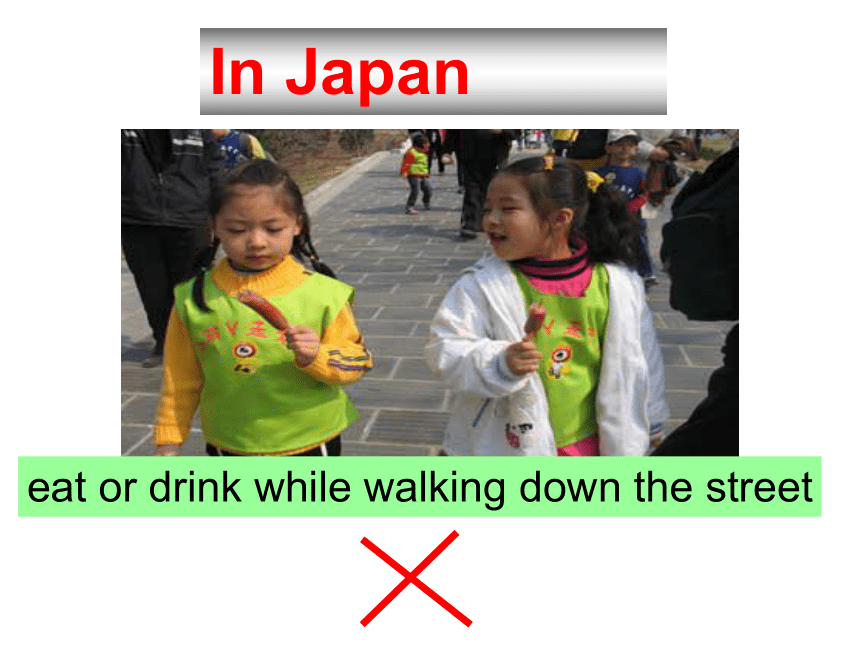
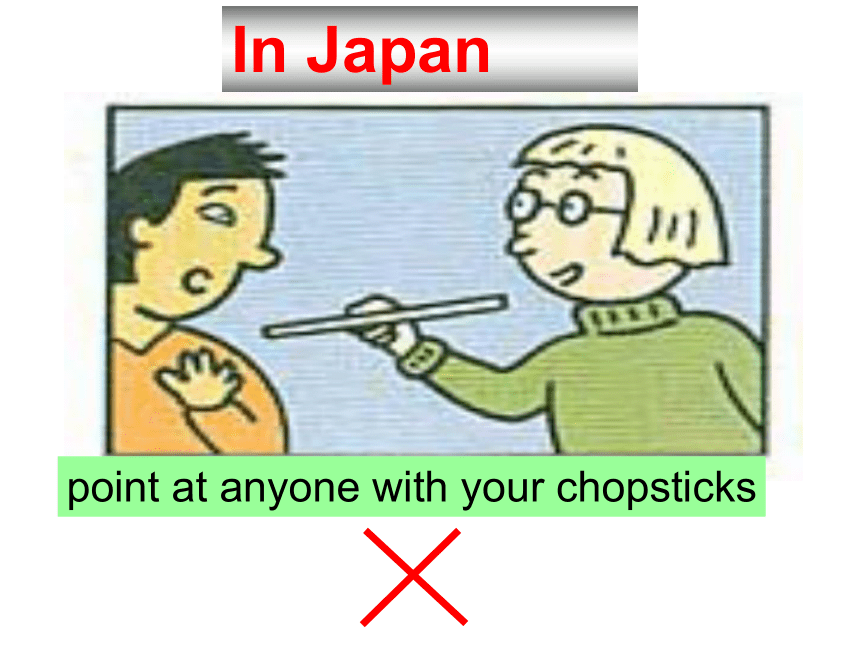
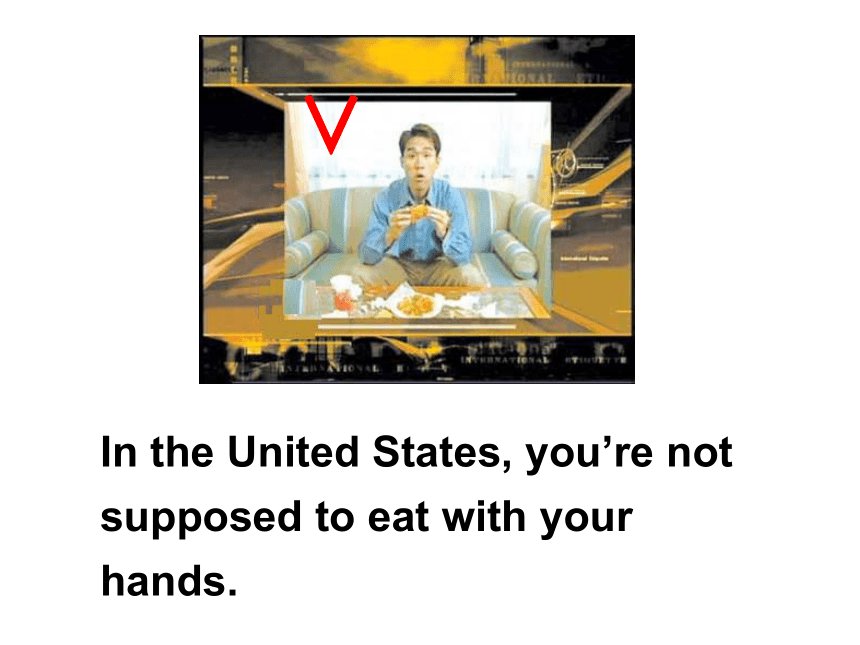
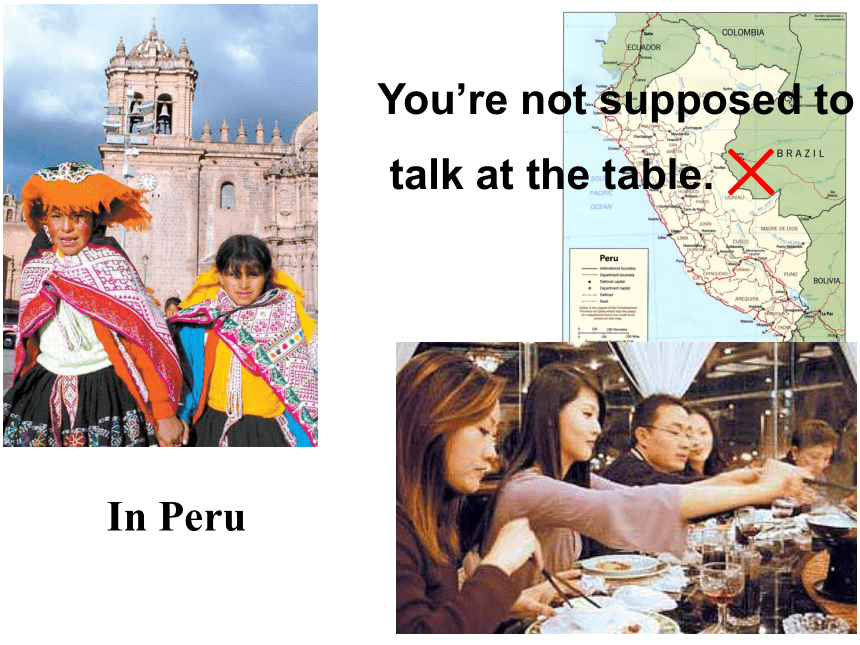
文档简介
课件27张PPT。 Unit 12
Section B-1Learning aims:
1. Learn some new words
2. To listen and talk about
table manners.
导学:
There are many table manners
around the world. But different countries have different culture.How much do you know
about table manners around
the world?Do you know some table manners in Japan?In JapanYou are supposed make noise while eating noodlesIn Japaneat or drink while walking down the streetIn Japanpoint at anyone with your chopsticksIn the United States, you’re not supposed to eat with your hands.∨In PeruYou’re not supposed to
talk at the table.×In China, you’re not supposed to pick up your bowl of rice.×In Korea, the youngest person
is supposed to start eating first.×In Brazil, you should wipe your mouth with your napkin every time you take a drink.∨Take the quiz and circle T or F( finish 1)
T F F F T 1.In Brazil, you should wipe your mouth with your napkin every time you take a drink.
在巴西, 每次喝完东西后你应该用餐巾纸擦嘴。
wipe 动词 意思是 “擦,擦去” 常与away, off, up 连用,表示“擦干净’’。如:
Wipe the dirt off your shoes.
抹去鞋上的污泥。
Wipe up the milk you spilled, please.
请抹掉洒出来的牛奶。2a. Listen and number the pictures in the order 2 1 4 32b. Listen again . Match these sentence partsd a b c 1. …to stick your chopsticks into your food.
把筷子插入你的食物中。
(1) stick 动词, “刺, 插入” 如:
I can’t move. There’s a piece of wire sticking in my leg.
我动不了, 有一根金属丝刺进我的腿
里了。
(2)chopstick 是由 “chop(砍)+stick(棍子)组成的合成词。意思是 “筷子” 它通常以复数形式出现。如:
Our Chinese always use chopsticks to eat, but the English don’t use them.
我们中国人通常用筷子吃饭, 而英国人不。2. It’s rude to point at anyone with your chopsticks.
用你的筷子指着别人是很不礼貌的。
rude adj. 粗鲁的; 无理的
常用词组be rude to sb, 意思是 “对某人无理”。I think it was rude of them not to phone and say that they weren’t coming.
他们来不了, 也不打电话通知一声, 太不象话了。point 是一个动词,意思是指, 指向。
它构成的词组” “point at”意思是“指
向” “对准”。 如:
“I’ll have that one.” She said, pointing at a big chocolate cake.“我想要这个。”她指着一块大的巧克力蛋糕说。Exercise 列举出几条作为学生在家或在学校等应该做和不应该做的。
(参照所给句型,尽量选用不同句型。)参考句型:
1.We are supposed to…/
We are not supposed to
We should / shouldn’t…
2.It’s polite/ rude to…
We are allowed to…
We aren’t allowed to…
We can/ could/ can’t/ couldn’t…
1.smoke
2.do our homework
3.get our ears pierced
4.speak aloud in/on…
5.be polite to sb…
6.clean up7.stay up
8.drive a car
9.wash the dishes
10.bring snakes to the classroom
11.choose our own clothes
12.make the bed by ourselves
13.run in the hallways
14.be late for school
Section B-1Learning aims:
1. Learn some new words
2. To listen and talk about
table manners.
导学:
There are many table manners
around the world. But different countries have different culture.How much do you know
about table manners around
the world?Do you know some table manners in Japan?In JapanYou are supposed make noise while eating noodlesIn Japaneat or drink while walking down the streetIn Japanpoint at anyone with your chopsticksIn the United States, you’re not supposed to eat with your hands.∨In PeruYou’re not supposed to
talk at the table.×In China, you’re not supposed to pick up your bowl of rice.×In Korea, the youngest person
is supposed to start eating first.×In Brazil, you should wipe your mouth with your napkin every time you take a drink.∨Take the quiz and circle T or F( finish 1)
T F F F T 1.In Brazil, you should wipe your mouth with your napkin every time you take a drink.
在巴西, 每次喝完东西后你应该用餐巾纸擦嘴。
wipe 动词 意思是 “擦,擦去” 常与away, off, up 连用,表示“擦干净’’。如:
Wipe the dirt off your shoes.
抹去鞋上的污泥。
Wipe up the milk you spilled, please.
请抹掉洒出来的牛奶。2a. Listen and number the pictures in the order 2 1 4 32b. Listen again . Match these sentence partsd a b c 1. …to stick your chopsticks into your food.
把筷子插入你的食物中。
(1) stick 动词, “刺, 插入” 如:
I can’t move. There’s a piece of wire sticking in my leg.
我动不了, 有一根金属丝刺进我的腿
里了。
(2)chopstick 是由 “chop(砍)+stick(棍子)组成的合成词。意思是 “筷子” 它通常以复数形式出现。如:
Our Chinese always use chopsticks to eat, but the English don’t use them.
我们中国人通常用筷子吃饭, 而英国人不。2. It’s rude to point at anyone with your chopsticks.
用你的筷子指着别人是很不礼貌的。
rude adj. 粗鲁的; 无理的
常用词组be rude to sb, 意思是 “对某人无理”。I think it was rude of them not to phone and say that they weren’t coming.
他们来不了, 也不打电话通知一声, 太不象话了。point 是一个动词,意思是指, 指向。
它构成的词组” “point at”意思是“指
向” “对准”。 如:
“I’ll have that one.” She said, pointing at a big chocolate cake.“我想要这个。”她指着一块大的巧克力蛋糕说。Exercise 列举出几条作为学生在家或在学校等应该做和不应该做的。
(参照所给句型,尽量选用不同句型。)参考句型:
1.We are supposed to…/
We are not supposed to
We should / shouldn’t…
2.It’s polite/ rude to…
We are allowed to…
We aren’t allowed to…
We can/ could/ can’t/ couldn’t…
1.smoke
2.do our homework
3.get our ears pierced
4.speak aloud in/on…
5.be polite to sb…
6.clean up7.stay up
8.drive a car
9.wash the dishes
10.bring snakes to the classroom
11.choose our own clothes
12.make the bed by ourselves
13.run in the hallways
14.be late for school
同课章节目录
- Unit 1 How can we become good learners.
- Section A
- Section B
- Unit 2 I think that mooncakes are delicious!
- Section A
- Section B
- Unit 3 Could you please tell me where the restroom
- Section A
- Section B
- Unit 4 I used to be afraid of the dark.
- Section A
- Section B
- Unit 5 What are the shirts made of?
- Section A
- Section B
- Review of Units 1-5
- Unit 6 When was it invented?
- Section A
- Section B
- Unit 7 Teenagers should be allowed to choose their
- Section A
- Section B
- Unit 8 It must belong to Carla.
- Section A
- Section B
- Unit 9 I like music that I can dance to.
- Section A
- Section B
- Unit 10 You're supposed to shake hands.
- Section A
- Section B
- Review of Units 6-10
- Unit 11 Sad movies make me cry.
- Section A
- Section B
- Unit 12 Life is full of the unexpected
- Section A
- Section B
- Unit 13 We're trying to save the earth!
- Section A
- Section B
- Unit 14 I remember meeting all of you in Grade 7.
- Section A
- Section B
- Review of Units 11-14
